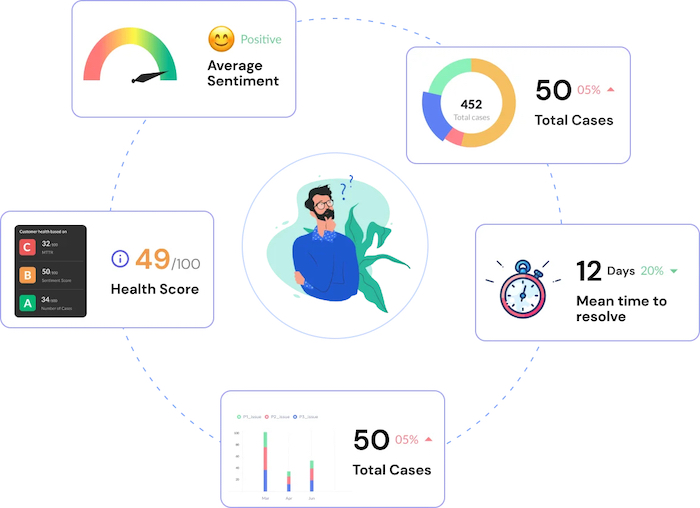Customer Health Score Prediction: Track to Boost CSAT & Prevent Churn
Understanding customer health is critical to the long-term success of any company. It helps predict the future state of your relationship with the customer, reveals areas where your product could be improved, and shines a light on support and success processes that may contribute to poor customer health and customer churn.
With proactive monitoring of customer health scores, CX teams can identify and resolve issues that lead to dissatisfied customers before they hit the crisis point and before they can consider discontinuing their relationship with your company.

Fortunately, SaaS companies have discovered the value of monitoring customer health. In fact, SaaS companies are 30% more likely to use customer health scores than their on-premise or other industry counterparts. Almost half–46%– use customer health scores to forecast churn and anticipate renewals. (Source).
But the news is not all good. Regarding keeping their health monitoring approach current, 48% of companies disclosed that they update their health score algorithm only once per year, and 33% report they do so manually. With such infrequent finetuning and the impracticality of doing so manually, CX teams put themselves at a disadvantage. (source: ibid)
With so many support, engineering, and business insights locked away in siloed throughout most SaaS companies, it’s no wonder teams defer creating a meaningful customer health monitoring strategy. In most companies, no one has access to all of those systems. Support doesn’t know the bugs associated with reported issues, engineering teams are blind to the business impact customer-reported issues represent, and business teams don’t know the impact customer support tickets have on customer retention.
IrisAgent unlocks siloed information across ticket management, bug tracking, and business systems to provide a 360° view of every customer in real time. Our proactive AI-powered approach means CX and business teams always have up-to-date insights to prioritize customers without ever having to update algorithms or adjust manual spreadsheets. We provide an aggregated health score derived from various sources and points in the customer’s journey to provide the most holistic picture of any customer. Here’s what IrisAgent’s custom health score includes:
What is a Customer Health Score?
A customer health score is a metric used by businesses to assess and quantify the overall well-being of their customer relationships. A customer health score formula incorporates valuable metrics to gauge customer relationships, weighing different metrics to develop an overall score. It provides a snapshot of a customer’s satisfaction, engagement, and likelihood to continue doing business with a company. The specific components of a customer health score can vary but typically include factors like:
Customer Satisfaction: This measures how content a customer is with the product or service they’ve received. It’s often collected through surveys, feedback forms, or Net Promoter Scores (NPS).
Engagement and Usage: Monitoring how frequently and extensively a customer is using the product or service can indicate their level of commitment and value derived.
Support and Service Interactions: Tracking the nature and frequency of customer support or service interactions can provide insights into their experience and potential issues.
Payment and Renewal Patterns: Understanding how consistently a customer pays for their subscription or renew their contract is crucial for predicting their future business.
Feedback and Complaints: The nature and volume of feedback, complaints, or escalations from a customer can reveal underlying issues or areas of improvement.
By aggregating and analyzing these metrics, companies can assign a numerical score to each customer, indicating their health. A high health score typically suggests a satisfied and engaged customer who is likely to continue their business, while a low score may signal potential issues or churn risk, prompting the company to take proactive measures to improve the customer’s experience. Customer health scores are valuable for customer success teams to prioritize their efforts and focus on the customers who need the most attention.
Definition and Importance of Customer Health Score
A customer health score is a quantitative measure used by businesses to assess the overall health or satisfaction levels of their customers. It combines various metrics such as product usage, customer engagement levels, satisfaction scores, and retention rates into a single numeric score. This comprehensive metric provides a snapshot of a customer’s relationship with the company, offering valuable insights into their satisfaction and engagement.
The importance of a customer health score cannot be overstated. It serves as a proactive tool for managing customer relationships, allowing businesses to identify early signs of churn risk and intervene with targeted retention strategies. By understanding and improving customer health, companies can enhance customer satisfaction, foster loyalty, and drive long-term revenue growth. In essence, a robust customer health score is a cornerstone of effective customer success management, ensuring that businesses can maintain strong and positive customer relationships.
Benefits of Using a Customer Health Score
Using a customer health score offers several significant benefits to businesses:
Improved Customer Retention: By identifying at-risk customers and addressing their concerns proactively, businesses can reduce churn and increase customer loyalty. A high customer health score indicates satisfied customers who are less likely to leave.
Enhanced Customer Satisfaction: A customer health score helps businesses understand their customers’ needs and preferences, enabling them to provide personalized support and improve overall satisfaction. This tailored approach ensures that customers feel valued and heard.
Increased Revenue Growth: By identifying upsell opportunities and taking targeted actions to improve customer health, businesses can increase revenue and drive growth. Satisfied customers are more likely to invest in additional products or services.
Better Customer Insights: A customer health score provides businesses with a deeper understanding of their customers’ behavior, preferences, and needs. This data-driven approach enables companies to make informed decisions and tailor their strategies to meet customer expectations effectively.
Incorporating a customer health score into your business strategy not only enhances customer satisfaction and loyalty but also drives sustainable growth and success.
Choosing the Right Metrics for Your Customer Health Score
Choosing the right metrics for your customer health score is crucial to its effectiveness. The selected metrics should align with your business goals and provide a comprehensive view of customer health. Here are some common metrics used in customer health scoring:
Product Usage Rate: This metric tracks how frequently and extensively customers use your product, indicating their level of engagement and dependency.
Customer Engagement Levels: Monitoring interactions such as logins, feature usage, and participation in community forums helps gauge customer involvement and interest.
Satisfaction Scores (e.g., Net Promoter Score): These scores reflect customers’ overall satisfaction and likelihood to recommend your product or service to others.
Retention Rates: Tracking the percentage of customers who continue to use your product over time helps measure loyalty and long-term satisfaction.
Customer Support Interactions: The frequency and nature of support interactions can reveal potential issues and areas for improvement in the customer experience.
Product Adoption Rates: Understanding how quickly and effectively customers adopt new features or products can provide insights into their satisfaction and engagement.
By carefully selecting and monitoring these metrics, businesses can create a robust customer health scoring system that accurately reflects customer health and guides strategic decisions.
Support Metrics to Consider for Customer Health Score Metrics
Number of escalated support cases
A large number of escalations can frustrate customers since they take longer to address than more common issues. Customers who wait longer for their issues to be resolved will be less satisfied than a customers with more common issues that get resolved faster.
Number of support cases
Everyone needs a little help now and then, but the frequency with which they interact with support agents reveals a lot about the customer’s health. Customers who contact support frequently are more likely to be less satisfied.
Time-to-resolve
Customer support teams set expectations for the time it should take to resolve a customer’s issue. When a customer’s average time-to-resolve fails to meet those standards, it is reasonable to assume that the customer’s satisfaction will dip.
Case Priority
Like time-to-resolve, most customer support teams have an internal process for establishing case priority. While not an empirical measure, understanding the “pecking order” of cases leads back to the health of the customer. All other things being equal, understanding the relative position of a customer’s issues among all active cases can be helpful. A customer with several high-priority cases can be a sign of a distressed customer, and struggling customers tend to be unhappy customers.
Case sentiment score
The words and phrases a customer uses when submitting a request for support provide a window into the customer’s health. IrisAgent uses natural language processing (NLP) algorithms to assign a sentiment score for each ticket.
CSAT
CSAT surveys reflect the in-the-moment sentiment of your customers. A single unproductive interaction with customer support may not result in an overall dip in a customer’s health score but consistent negative feedback clearly indicates there’s work to be done to prevent the customer from becoming at risk of churn.
Product Metrics to Consider for Customer Health Score
Product engagement
Understanding the frequency and depth of a customer’s use of your product reveals how dependent your customer is on your product. This metric is sometimes described as the “toothbrush test.”- Is it something your customer uses every day? Knowing which customers are active users vs. casual users helps identify customers likely to churn. In addition, insight into which features your customers use most often can help get to the root cause of a support request because you understand the context in which the issue is likely to have occurred.
Business Metrics to Consider for Customer Health Score
Annual Contract Value (ACV)
ACV gives you a clear picture of the value of each customer by normalizing the total income over the contract length. Understanding the effect your support strategy and performance have on your highest-value customers should drive your approach to support them and reinforce the importance of keeping that segment of your customers happy.
Renewal timeframe
68% of customers churn because they believe the company providing the service/product doesn’t care about them, and many of those losses occur at the renewal point. Companies close to their renewal dates should be monitored carefully to avoid unexpected non-renewals.
Upsell/cross-sell potential
Excellent customer support can drive upselling and cross-selling revenue. To achieve this, organizations must build a support team that turns customers into advocates, thus increasing the confidence in your company and ultimately driving more revenue for the company.
Assigning a Common Scale to Each Metric
Assigning a common scale to each metric is essential for calculating a customer health score. Consistency across all metrics ensures that the score accurately reflects the relative importance of each factor. A common scale used in customer health scoring is a 0-100 scale, with 0 indicating a poor score and 100 indicating an excellent score.
This standardized approach allows businesses to aggregate different metrics into a single, cohesive customer health score. For example, product usage, customer engagement, and satisfaction scores can all be converted to a 0-100 scale, making it easier to compare and analyze customer health across various dimensions. By using a consistent scale, businesses can ensure that their customer health scores are objective, reliable, and actionable.
Understanding the Need for a Standardized Scale
A standardized scale is necessary to ensure that the customer health score is consistent and comparable across all customers. Without a standardized scale, the score would be subjective and prone to bias, making it difficult to compare and analyze customer health across different segments. A standardized scale also enables businesses to set clear thresholds for intervention, ensuring that customers receive timely and effective support.
By implementing a standardized scale, businesses can create a more accurate and reliable customer health scoring system. This consistency allows for better benchmarking, trend analysis, and decision-making, ultimately leading to improved customer satisfaction and retention. A standardized scale is a foundational element of an effective customer health scoring system, providing the clarity and precision needed to manage customer relationships successfully.
How to Increase Customer Health Score?
To increase a customer health score, businesses should focus on nurturing strong and positive customer relationships. Here are several strategies to consider:
Proactive Communication: Reach out to customers regularly with personalized and relevant content, updates, and offers that align with their needs and interests.
Exceptional Support: Provide efficient and effective customer support, resolving issues promptly and ensuring that customers feel valued and heard.
Product Education: Offer resources and training to help customers fully utilize your product or service, showcasing its value.
Surveys and Feedback: Actively seek customer feedback through surveys to gauge satisfaction, identify pain points, and make necessary improvements.
Monitoring and Analysis: Continuously monitor customer behavior, engagement, and usage to spot trends and potential issues early.
Personalization: Customize your interactions and recommendations to suit individual customer preferences and pain points.
Renewal Management: Ensure smooth renewal processes and offer incentives for contract extensions.
Regular Check-ins: Schedule periodic check-in calls or meetings to discuss customers' evolving needs and how your offerings can address them.
By consistently delivering value and paying attention to customer feedback and behavior, businesses can improve their customer health scores, which, in turn, lead to stronger and more sustainable customer relationships.
Staying on top of every customer’s health is critical to the success of your company but–as the old saying goes–you can’t manage what you don’t measure. By continually measuring support, business, and product metrics, IrisAgent helps support agents tailor conversations to the customer's product adoption journey with empathy and patience, engineering teams can understand how bugs, releases, and regressions impact customer health, and success teams can head off issues that might impact retention and upgrades/cross-sells, all from a single dashboard. To learn more, visit our customer health product page or book a demo today.




